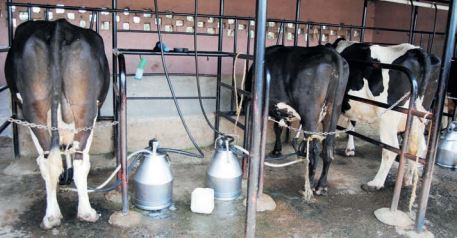

Large-scale dairy farmers in Rift Valley have opposed a plan by the government to vaccinate animals from January, terming the move “suspect and of no use.”
The farmers said it was wrong for the government to force the vaccination on them, yet they had not complained of any challenges or diseases affecting livestock.
They want the government to drop the plan and use the money to improve the Social Health Authority so Kenyans can enjoy better healthcare.
Farmers’ representatives who spoke in Eldoret included Thomas Bowen, Thomas Korogoren, Daniel Mburu, and Abraham Murei.
“We do not understand where this issue of vaccinations of all livestock is coming from. It’s clear that this is a plan by some people to enrich themselves, and we will not accept that. We are tired of the tendency by this government to force everything on us,” Bowen said.
He alleged that there appeared to be some individuals misadvising the government with the sole intention of selfish gains.
Bowen said it is time the government recognised the need to consult farmers and the general populace on some of its policies, which they say are hurting the country.
Korogoren said the government should direct the funds for the vaccination to important issues affecting the agriculture sector, such as the low prices of maize, fake seeds, and fertiliser, and the possible collapse of New KCC.
“When we look clearly, all sectors, including agriculture, are collapsing, and we wonder where these people in government are taking us. We are headed in the wrong direction,” he said.
Mburu said they will not support the plan because they have all along been vaccinating their livestock whenever need arises.
“Currently, the main problem we have is SHA enrollment because people are dying due to a lack of good healthcare. Instead of these people thinking about our lives, they want to also enrich themselves using our livestock,” he said.
Murei said vaccination of animals is not important at the moment and the government should relook into “its misplaced priorities.”.
He said the price of milk is so low compared to the cost of production.
“Even water is more expensive than milk, and we feel wasted as farmers,” Murei said.
He said the “continued distribution of fake seeds and fertiliser” would hurt the country’s food security.
The farmers spoke as Agriculture CS Andrew Karanja urged Kenyans to ensure their livestock are vaccinated once the vaccination drive starts next month.
Karanja said the vaccination drive targets more than 22 million heads of livestock and is aimed at boosting the health of animals in all parts of the country and will shield them from communicable diseases that have been affecting them from time to time.
He said many counties have been experiencing outbreaks and carrying out individual vaccination campaigns that have proven unsuccessful.
“This is for the benefit of the country and will shield livestock from diseases like foot and mouth that have been a challenge in the past,” Karanja said.
“Currently, one county carries out vaccination drives but others do not so they are ineffective. That’s why we have started a national campaign.”
Karanja assured Kenyans the vaccines would be safe and of good quality, encouraging Kenyans to bring out their livestock for vaccination once the drive starts. He dismissed claims by some political leaders that the government has an ulterior motive in the vaccination drive.
Wiper leader Kalonzo Musyoka has claimed there is a foreign agenda in the campaign and it will alter the genetic structure of local livestock breeds.
This, Kalonzo has said, will have adverse effects on the health of Kenyans. He urged Kenyan’s to reject the exercise, warning of plans to turn Kenyans into guinea pigs.
“The negative consequences are twofold. The first issue is the deterioration of livelihoods in pastoralist communities,” Kalonzo said.
“The second is, of course, human exposure to unusual industrial meats, the ramifications of which have yet to be completely investigated. Essentially, these are side effects.”
But Karanja said the vaccines would be produced locally at the Kenya Veterinary Vaccines Production Institute (Kevevapi).
“Farmers from all over the country, especially livestock farmers, come out in large numbers in January. The vaccines are produced locally. They will not be imported from any other country,” he said.
President Ruto has faulted those
opposed to the animal vaccination
that he said would greatly boost livestock production.










